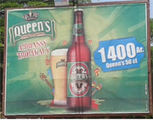New report on alcohol advertising in Madagascar
The government of Madagascar has a legislative base to restrict alcohol marketing in the ‘Code Général de Impots’. However, alcohol producers and advertisers are breaking this law en masse, concludes a new EUCAM report from Madagascar.
The European Centre for Monitoring of Alcohol Marketing (EUCAM) is working together with local partner organizations to monitor marketing of alcohol in African countries. Four countries were covered in their first MAMPA report; Gambia, Ghana, Nigeria and Uganda. Part two of the MAMPA project (Monitoring of Alcohol Marketing Practices in Africa) will cover Kenya, Malawi, Namibia and Zambia.
In October 2013 a separate monitoring exercise was conducted in Madagascar, supported by Blue Cross in Madagascar and Norway. The exercise covered online, print and outdoor media in and around the capital Antananarivo. The report is presented and can be downloaded here.
Main findings of the study include:
- Alcohol retailers and bars frequently break the law by placing their establishment within a 150 meter radius of religious buildings, educational institutions, hospitals and etc.
- Alcohol advertisers frequently break the law by using image advertising, instead of using merely product information.
- In outdoor areas on average 48.4 alcohol ads were identified per 0.25 km2.
- Alcohol ads are twice as likely to be found around schools, compared to other places.
- Online, claims were identified suggesting that light alcoholic beverages can be consumed by any member of the family.
- Analysis of print media frequently identified unofficial ways of marketing (editorial content, sponsorship of events and sports, as well as job offerings).
The EUCAM report concludes that a comprehensive ban on advertising, promotion and sponsorship would reduce alcohol–related harm, and that self-regulation is an ineffective mechanism to reduce alcohol-related harm. Effective legislation remains necessary to strictly regulate alcohol marketing activities; Furthermore, this preliminary monitoring of alcohol marketing showed that many alcohol advertisements refer to values that are highly appreciated by large groups of Malagasy.
Suggestions to sexual and economic success and a glorious, western lifestyle are often used in alcohol advertisements and are absolutely unethical. Just as the ‘Code Général de Impots,’ state, alcohol advertisements should be restricted to information of the product only; which includes that the product is not to be exhibited in a setting with people or any other context glamorizing the alcoholic product.
(Picture: EUCAM, from Madagascar report)
RELATED ARTICLES
- New report highlights benefits of policy measures to prevent harmful alcohol consumption
- Alcohol use - a barrier to health and to the achievement of the SDGs
- Government investments in alcohol industry up against the wall
- Abstracts for GAPC 2020 – deadline 29 July 2019
- Involve young people as partners in prevention!
- A regional African alcohol coordination mechanism is needed
- New book reveals a series of unethical business practices by Heineken in Africa
- Next GAPC to be held in Dublin in March 2020
- SAFER – a new WHO initiative to boost national alcohol policy processes
- Trouble Brewing

